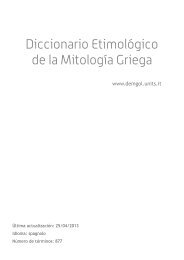Diccionari Etimològic de la Mitologia Grega
Diccionari Etimològic de la Mitologia Grega
Diccionari Etimològic de la Mitologia Grega
Create successful ePaper yourself
Turn your PDF publications into a flip-book with our unique Google optimized e-Paper software.
<strong>Diccionari</strong> <strong>Etimològic</strong> <strong>de</strong> <strong>la</strong> <strong>Mitologia</strong> <strong>Grega</strong> - www.<strong>de</strong>mgol.units.it<br />
El nom, que semb<strong>la</strong> testimoniat ja en micènic pe-te-u (KN As 603.3), <strong>de</strong>riva <strong>de</strong> πένθος, "patiment", etimologia proposada<br />
ja en Eurip. Bacch. v. 508); significa per tant "home <strong>de</strong>l dolor". Segons Chantraine (DELG) i Perpillou (Les substantifs grecs<br />
en -ευς, § 207) es tracta probablement <strong>de</strong> <strong>la</strong> reducció d'un nom més l<strong>la</strong>rg, cfr. els hipocorístics Πένθιλος o Πένθυλος.<br />
Categoria: Herois<br />
Πέρδιξ<br />
PÈRDIX<br />
Germana <strong>de</strong> Dèdal, mare d'un Tàlos (Hel<strong>la</strong>n. Fr. 169 Fowler = Schol. Eur. Or. 1648) o Kàlos (Apollod. Bibl. 3, 15, 9;<br />
segons algunes fonts també ell s'hauria di Pèrdix), un jove que va aprendre <strong>de</strong> l'oncle matern l'ofici d'artesà. Segons un<br />
fragment <strong>de</strong> Sòfocles (Fr. 323 P.) citat per <strong>la</strong> Lex. Suda (s. v. Πέρδικος ἱερόν, pi. 1042. 1-5), Pèrdix - Kalos hauria estat<br />
precipitat <strong>de</strong>s <strong>de</strong> l'Acròpolis d'Atenes pel mateix Dèdal, gelós <strong>de</strong> veure com el jove havia inventat <strong>la</strong> serra (Apollod.<br />
Bibl. ibi<strong>de</strong>m, Pausan. 1, 21 4; 26 4); i el compàs (Ovid. Metam. 8, 247-249), el cisell, i fins i tot <strong>la</strong> roda <strong>de</strong>l torner (Diod.<br />
Sic. Bibl. 4, 76, 4-7), inspirant-se en l'espina d'un peix o en <strong>la</strong> mandíbu<strong>la</strong> d'una serp; Atena l'hauria salvat transformant-<br />
lo en ocell, en aquest cas <strong>la</strong> perdiu (Ovid. Metam. 8, 250-259), en el moment en què Dèdal el va fer precipitar <strong>de</strong>s <strong>de</strong><br />
l'Acròpolis. La història forma part <strong>de</strong> les tradicions <strong>de</strong> metamorfosis re<strong>la</strong>tives a <strong>la</strong> recerca <strong>de</strong>ls heuretài, els primers<br />
inventors d'instruments artesanals o d'altres innovacions.<br />
El nom significa "perdiu", perdix (caccabis) graeca (D'Arcy Thompson s. v.); semb<strong>la</strong> que podria <strong>de</strong>rivar <strong>de</strong>l so que aquesta<br />
au fa quan alça el vol, que recorda el so <strong>de</strong> <strong>la</strong> f<strong>la</strong>tulència corporal (<strong>de</strong>ls humans), expressat en grec amb el verb ἀπο-<br />
πέρδομαι, "fer un pet". El suffix -ik- s'utilitza sovint per formar noms d'animals (Chantraine, DELG, s. v. πέρδιξ).<br />
Categoria: Persones<br />
Motiu: Metamorfosi<br />
Πέργαμος<br />
PÈRGAM<br />
El més jove <strong>de</strong>ls fills <strong>de</strong> Pirrus - Neoptòlem i d'Andròmaca, que va es<strong>de</strong>venir-ne <strong>la</strong> concubina <strong>de</strong>sprés <strong>de</strong> <strong>la</strong> mort<br />
d'Hèctor i <strong>de</strong> <strong>la</strong> caiguda <strong>de</strong> <strong>la</strong> ciutat <strong>de</strong> Troia. De l'Epir, on havia nascut, va emigrar a Teutrània (Asia Menor, Mísia), a<br />
<strong>la</strong> <strong>de</strong>sembocadura <strong>de</strong>l riu Caicus, i allà, <strong>de</strong>sprés <strong>de</strong> <strong>de</strong>rrotar en combat singu<strong>la</strong>r un tal Areius, rei d'aquel<strong>la</strong> terra, va<br />
conquerir-ne el regne, tot <strong>de</strong>dicant un monument (mnèma) a <strong>la</strong> memòria <strong>de</strong> <strong>la</strong> seva mare. Es va convertir així en el<br />
fundador i rei epònim <strong>de</strong> <strong>la</strong> ciutat asiàtica <strong>de</strong> Pèrgam (Paus. 1, 11, 1 ss.). Una altra tradició vol que Pèrgam hagi estat<br />
fundada per Grinus, <strong>de</strong>scen<strong>de</strong>nt <strong>de</strong> l'heroi Tèlef, que hauria fet venir <strong>de</strong> l'Epir en ajut seu l'heroi Pèrgam, i l'hauria<br />
honorat posant el seu nom a <strong>la</strong> ciutat (cfr. Serv. ad Verg. Ecl. 6, 72).<br />
El topònim podria <strong>de</strong>rivar <strong>de</strong> l'indoeuropeu *bhrgh-o- *bhergh-, "protegir" (cfr. Pokorny, Indog. Etym. Wört., p. 140)<br />
amb sufix -αμο, present com a -ασο en noms minorasiàtics i il·lírics, cfr. el patronímic <strong>de</strong>l troià Deicoont, Περγασίδης,<br />
Hom. Il. 5, 534-535 (von Kamptz, Homerische Personennamen p. 138, § 49c; p. 341, § 82). Segons Van Win<strong>de</strong>kens (Le<br />
Pé<strong>la</strong>sgique, p. 131) es tractaria d'un nom pelàsgic, atès que a partir d'aquesta llengua es po<strong>de</strong>n explicar els canvis<br />
consonàntics β / π- ocorreguts en el pas <strong>de</strong> l'indoeuropeu. Semb<strong>la</strong> probable que el nom <strong>de</strong> l'heroi epònim <strong>de</strong>rivi <strong>de</strong>l<br />
64







